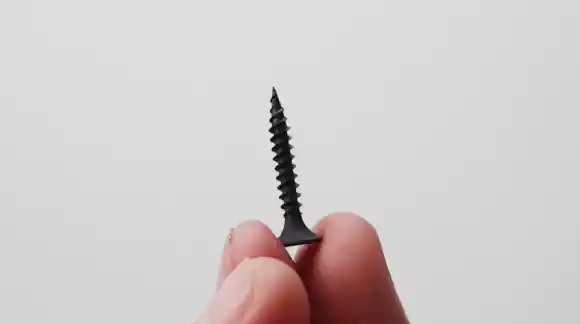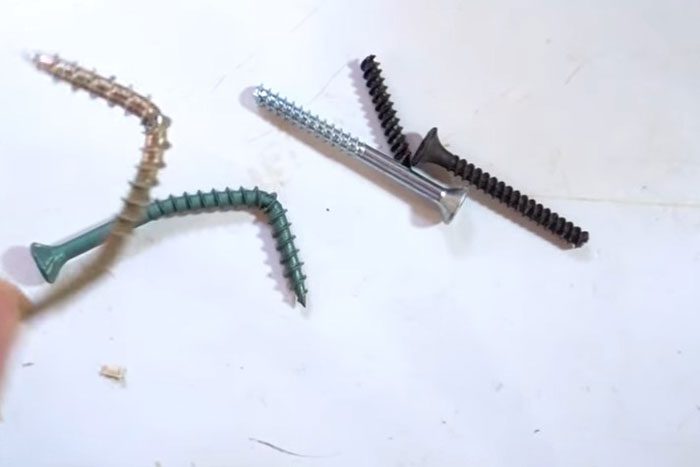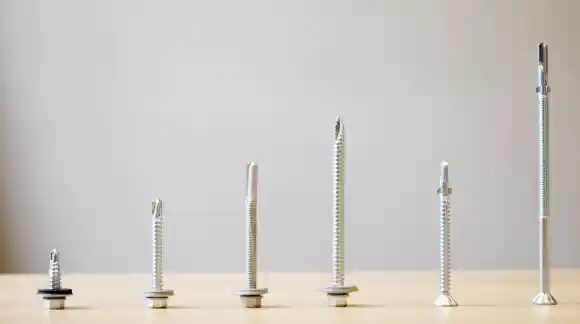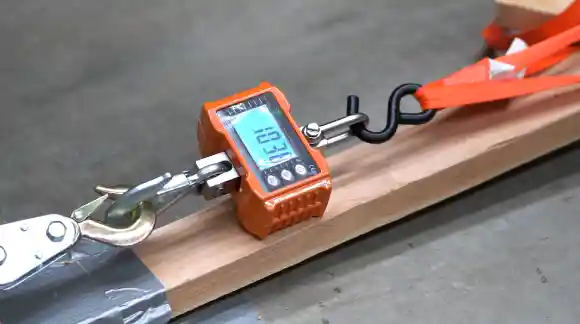Last Updated on March 21, 2023
No matter how great you think your drywall screws look, they may not be able to handle the weight of heavier items in your home. Standard screws lack durability and strength, so if you’re looking for a project that involves more than hanging something on the wall, consider using a drywall anchor or a stud.
To hang up items, be sure to do it safely and securely by considering factors like the size of the screw being used, what material the wall is made from and how firmly you’ve secured them in place. Let’s make sure nothing falls off unexpectedly or causes an untimely injury.
Let’s dive deep into the power behind these tiny fixers and see if they can tackle any challenge.
Can Drywall Screws Hold Weight: The Basics

When determining which type of fastener to use, the first step is determining the size and weight of the object you want to hang. Drywall screws are built with a sharp point that allows them to penetrate the wallboard material, providing more support than other types of screws.
Despite this, they are still limited in terms of their ability to securely hold large or heavy items. The amount of weight that can be put on a regular screw depends on the type and size of the screw and the material it is attached to. Generally speaking, small wood screws (3/4 inch) are sufficient for light loads such as picture frames or shelf brackets.
If you have heavier items to hang, such as a mirror or statement wall art piece, ensure those screws are strong enough for the job. We recommend lag screws and hollow-wall anchors. They’re designed specifically for loads that require extra holding power.
These screws generally have wider threads and larger heads than standard drywall screws. Which means they can handle more weight without compromising their integrity.
Many people mistakenly believe that all wall types are created equal when it comes to supporting heavy items. As previously mentioned, some materials, such as drywall screws, cannot hold much weight. So special care must be taken for heavier applications where stronger anchors may be required.
Also, drywall screws should never be used in any type of structural application as they are not suitable for this purpose due to their limited strength capacity.
How Much Weight a Single Drywall Screw Can Hold: Factors to Determine
Several factors come into play when determining how much weight each drywall screw can support. Here are a few important ones:

Quality of the Screw
The quality of the screw is one of the most significant factors in determining load capacity. If the screw is made from cheap materials and is not well-constructed, it won’t be able to hold very much weight at all.
Type of Drywall Screw
Different types of drywall screws will have varying amounts of holding power based on their design and the material used in construction. For instance, self-tapping “bugle head” steel drywall screws are excellent for light tasks, while #8 coarse thread steel screws are better suited for heavier projects.
The Length of the Drywall Screw

A longer screw has more material that can hold onto surfaces more securely than a shorter one. Also, when two pieces of wood are joined together at close intervals, longer screws are necessary as they create more contact points and provide greater support for these connections.
Points Per Inch (PPI) in Drywall Screw Strength
PPI refers to the number of threads per inch in a drywall screw. As PPI increases, there’s more material along each thread, which holds onto surfaces securely compared to lower-density options.
The Type and Thickness Of Wallboard Material
Wallboard material also plays a major role in how much weight each screw can hold. Generally speaking, thicker wallboards should be used along with longer-length screws whenever possible to take advantage of their higher levels of structural strength capabilities.
The Size Of The Pilot Hole
The hole size that the drywall screw is inserted into determines how much weight it can take. If the pilot hole is too large, it may not secure the screw tightly enough, reducing its ability to handle heavy loads.
How Do You Know If a Screw Is Strong Enough?

The strength of a screw depends significantly on the material it is made from. Generally, screws made from steel or stainless steel are considered to be the strongest and most durable. Meanwhile, other materials like brass or bronze can also be used for certain types of applications.
When selecting a screw, consider its length, diameter, and material. For example, longer screws provide more holding power than shorter screws since there is more contact surface with the material it’s being installed into.
Thicker screws are usually stronger and more resistant to pulling out compared to thin screws. It’s also important to consider the type of wood or material being used to ensure that the screw is compatible with it and won’t cause any damage.
If in doubt, try testing it on a scrap piece of wood first before using it in an application where failure could cause harm or damage.
Do Drywall Screws Need Anchors to Be Used?

In certain applications, drywall screws do need anchors to be used. When you’re facing a masonry wall, plaster or concrete walls require much more support and stability. That’s why drywall anchors are the ideal choice for these particular surfaces.
It is advisable to use them instead of relying on regular screws, their added strength will help hold everything together confidently.
Also, if there isn’t a metal stud behind the wall and you’re just trying to attach something to the drywall surface, then an anchor is necessary to keep it secure. No matter what project you tackle, drywall anchors come to the rescue.
There’s an anchor that fits your every need, from plastic anchors and metal models in various sizes. It is essential to select the right size and type of anchor to fit correctly into the wall or surface to which it is being attached.
Mounting something on the wall no longer needs to be a struggle – there are plenty of dependable anchor options with screws included. For example, a self-drilling drywall anchor with screws, self-drilling drywall plastic anchors with screws, and premium drywall anchors with screws all work well.
What Causes Drywall Screws to Break?
Drywall screws play an integral role in the structural integrity of walls and ceilings. But they can be surprisingly prone to breakage. Here are some of the most common causes of drywall screw breakage:

Over-tightening
When installing drywall screws, it’s important not to overtighten them as this can cause excessive pressure on the screw itself and the surrounding material. Ideally, each screw should be tightened just enough to hold firmly without causing any damage.
Poor Installation
Drywall screws can break through when they are not properly installed or driven into the wall too deeply. This often happens when a power drill or hammer drives the screws in too hard, overdriving them and causing them to protrude from the wall.
Expansion/Contraction
Over time, drywall studs can expand and contract due to changes in temperature and humidity levels. This causes the studs to move slightly, pushing against the drywall screws with increased pressure and eventually leading them to break through.
Poor Quality Screws

Low-quality screws often have lower tensile strength than higher-quality ones. Making them more prone to breaking through under pressure or putting weight on them.
Improper Fastening Angle
If a screw is not applied at an accurate vertical angle, it won’t get a secure grip on the studs behind the drywall and will likely pull through over time due to movement if anything hangs on it.
Loose Fit
When driving a drywall screw into place, there should be some resistance but not too much. If there’s little resistance, it means either the hole is too small for the screw, or there isn’t enough friction between its threads. This can cause weakened screws that fail sooner.
Not Using Backer Boards
Installing a thin piece of wood behind each screw provides extra support so that there won’t be any slippage or loosening of the screw over time, which could cause it to break through eventually.
Weak Wall Support Structure
The wall’s support structure needs to be strong enough to hold drywall screws securely in place without any movement or shifting of its components over time. Otherwise, this can lead to screws breaking through as well.
Are Drywall Screws Good for Hanging Cabinets?

No, drywall screws are not recommended for hanging cabinets due to their weak head, which snaps off easily when too much force is applied. This can make it difficult or unachievable for the screw to hold the cabinet securely.
Instead, lag bolts or toggle bolts should be used whenever possible when attaching cabinets to walls. Lag bolts are particularly well suited for heavier objects like cabinets as they can provide greater levels of strength and durability.
For lighter items, toggle bolts may also be used with great success. They are designed specifically for hollow walls and surfaces like drywall where additional anchoring support may be necessary.
Is Drywall Screw Strong Enough to Hold 50 Pounds?
When used with drywall screws such as toggle bolts or metal wall anchors, drywall screws can hold up to 50 pounds. When installing a drywall screw, it is essential that the screw is long enough and driven into the wall stud so that it firmly holds whatever you are hanging.
Also, when using a toggle bolt or metal wall anchor, choosing the right size for your desired weight load is essential. These anchors come in different sizes and can support 50 pounds, depending on which size you select. Aside from that, these anchors must be securely attached to hold up their desired weight loads.
Does Drywall Screw Hold 100 Pounds?

Believe it or not, an ordinary drywall screw can hold a whopping 100 pounds if used with steel hollow-wall anchors. Once the screws penetrate into your wall surface, these special metallic sleeves expand and grab onto whatever’s inside the cavity to provide unbeatable support.
The steel hollow-wall anchors also provide superior strength and durability, allowing them to hold heavier loads than other types of wall anchors. The drywall screw provides a secure connection between the wall and the object, while the hollow-wall anchor distributes the load across a larger area, allowing it to safely support up to 100 pounds.
When installing drywall screws and steel hollow-wall anchors, it is essential to read and follow manufacturer instructions carefully for the best results.
Know Your Drywall Screws Weight Capabilities
Before you hang any heavy objects using drywall screws, consider their capacity first. Different types and sizes can carry different amounts of weight, but all have limitations. Verify that your project is firmly anchored to guarantee safety & success.
Get your project off to the right start by ensuring you have exactly what you need for success: drywall screws and the best drywall anchor. Now that you’ve got a handle on their capabilities, strengths, and limitations, feel free to take on any task calling for installation work in plasterboard.



